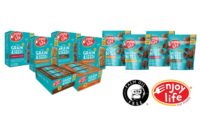Palm oil is naturally
resistant to oxidation and provides a long shelf life to baked goods and
deep-fat frying operations.
Palm oil is naturally resistant to oxidation and provides a long shelf life to baked goods and deep-fat frying operations.
It contains no linolenic acid (the most unstable fatty acid in vegetable oil) and the total content of polyunsaturates is 10%, compared to 60% in soybean oil.
Loders Croklaan has developed more than 30 palm oil-based shortenings and oils providing an off-the-shelf solution for almost every bakery and frying application that currently uses partially hydrogenated vegetable oil.
When looking for a replacement for a partially hydrogenated shortening, comparing the solid fat profile and melting point to the corresponding palm oil product is a useful first step. It is not realistic to expect an exact match because of the large differences in fatty acid compositions.
Palm oil, or a slightly harder or softer version of palm oil, is usually a drop-in solution for typical all-purpose shortenings, used, for example, in cakes and cookies. Some applications including pies and Danish and puff pastries require a more sophisticated shortening. Stability is further increased by the presence of natural antioxidants. Shelf life and fry stability of all palm oil products are comparable to partially hydrogenated vegetable oil.
Regular palm oil tends to become brittle when cool, and softens excessively as it warms up. These applications need a fat that remains soft at lower temperatures, and resists melting at high temperature. Appropriate blends of palm fractions provide the temperature tolerance needed for demanding applications.
For more information on these oils, please visit www.croklaan.com.
Editor’s Note: The Channahon, Ill.-based company provided information for this article.
Related Articles
Related Products
See More ProductsSee More ProductsEvents
View AllSubmit An Event-
September 9, 2010 Food Plant of the Future: Surviving and Thriving with Automation
×
Get our new eMagazine delivered to your inbox every month.
Stay in the know on the latest snack and bakery industry trends.
SUBSCRIBE TODAY!Copyright ©2024. All Rights Reserved BNP Media.
Design, CMS, Hosting & Web Development :: ePublishing



